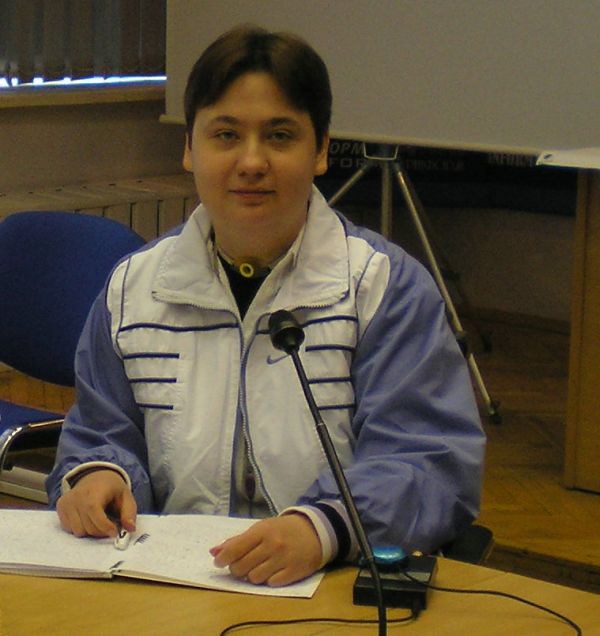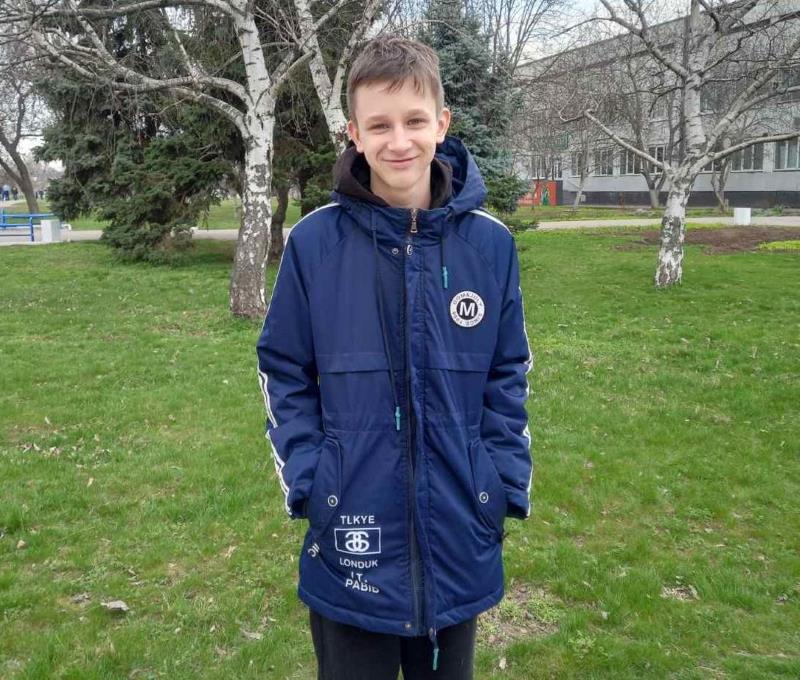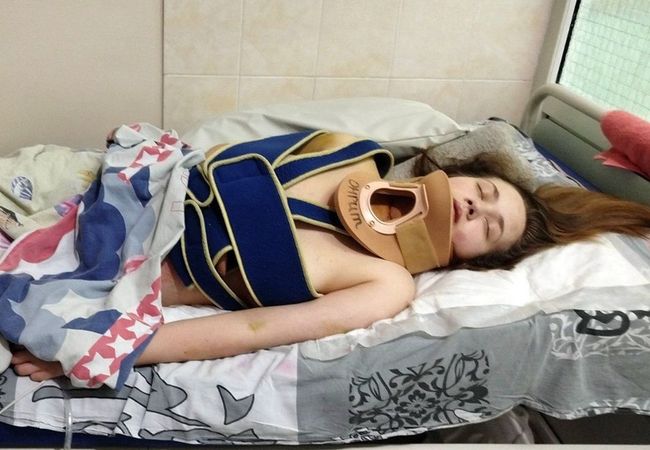If Ukraine were to present a Volunteer of the Year award, it would be impossible to imagine a more deserving candidate than ZaporizhzhyaвАЩs twenty-three year old Ira Gavrisheva. Though tied to a wheelchair and suffering from misdiagnosed myasthenia gravis and breast cancer, Ira devotes long hours to advocating for patientsвАЩ rights and to helping children in the Zaporizhzhya Regional ChildrenвАЩs HospitalвАЩs oncology unit. As she wrote in her вАЬMemories,вАЭ вАЬin 1997, my life split into two parts: вАШbeforeвАЩ and вАШafter.вАЩ IвАЩd spent three weeks in the oncology unit. вАЬFrom that time on, I knew my life would never be the same.вАЭ

Ira Gavrisheva
вАЬвА¶ maybe I survived that hell,вАЭ she wrote of the three years she spent in this oncology unit вАЬso that I could help people understand the world in which hundreds of Ukrainian children live: a world full of fear and sorrow but also of hope and faith, and to challenge the public to look beyond mere statistics at the childrenвАЩs lives those numbers represent. Maybe it was done so that many years later I could tell healthy people that hell exists, that itвАЩs here on earth, in the oncology unit of a childrenвАЩs hospital. вА¶ In these memories I have tried to record the moments that I remember best: moments that impressed me and moments that shocked me -- moments I had kept silent about for seven years because I lacked the strength to relive them.вАЭ

The impact on Ira of the following excerpt will be obvious to all who read it.
A Nickel
Translated from Russian by Natalia Guzenko and
Edited by Anne Linden
A bald five-year-old boy ran into the room. вАЬMom,вАЭ he asked, вАЬare we doing the IV today?вАЭ
вАЬNo, Anton,вАЭ his mother replied, looking down at her feet.
вАЬThatвАЩs great!вАЭ replied Anton. вАЬDoes that mean I can go play with the guys?вАЭ
вАЬYes, son. Go,вАЭ his mother told him.
The boy left and his mother burst into tears. His skin and the whites of his eyes had turned light yellow. Anton had Hepatitis C, contracted in the childrenвАЩs hospitalвАЩs oncology unit. Any infection could prove deadly for children with cancer and Hepatitis C can be fatal even for children who are otherwise healthy.
In order to eliminate deadly toxins from his liver, Anton had to take more than three bottles of glucose daily through an IV. That meant his mother had to buy 3 bottles of glucose, an IV kit and two syringes every day. Two bottles of solution and one syringe were lying on the windowsill.
вАЬWhere is Anton?вАЭ asked the nurse as she walked into the room. вАЬWeвАЩll be doing his IV now. Where is his IV kit?вАЭ she asked, as she glanced at the items on the windowsill.
вАЬLuda, I donвАЩt have oneвАЭ AntonвАЩs mother confessed, вАЬand I donвАЩt have any money with which to buy one either. Look,вАЭ the woman took her purse from under her sonвАЩs pillow and opened it. There was a picture of Anton, tanned and cheerful, sitting on a swing. The picture had been taken six months earlier, the month before his nose had bled for the first time. Other than that, her purse was empty. Nadya had spent all the money she had left for the syringes lying on the windowsill.
вАЬIвАЩm sorry,вАЭ the nurse explained as she headed for the door, вАЬbut without the IV kit, we wonвАЩt be doing the transfusion today.вАЭ

Nadya was holding her empty purse in her hands. Anton was her only son. SheвАЩd never seen the childвАЩs father after telling him she was pregnant. When her son was diagnosed with neuroleukemia, thereвАЩd been no one around to help. His first chemo treatments had wiped out her savings. From then on, theyвАЩd had to choose: food or medicine. For months, theyвАЩd been living on foul looking hospital porridge. Then came a day when there was no money for medicine. Not even enough for IV kits. Nadya turned her purse upside down. A single coin fell to the floor: a nickel. Nadya held the coin thinking, вАЬTodayвАЩs treatment would have cost $!0.00 but all I had was a nickel.вАЭ
вАЬMom, whatвАЩs that in your hand?вАЭ Anton was peeping through a partially opened door.
вАЬMoney,вАЭ she replied, smiling ironically. How could anyone call a nickel money?
вАЬWould you give it to me?вАЭ Anton asked, reaching out his hand. Once heвАЩd had a coin box. HeвАЩd been saving up for roller blades. But the coin box had been his diseaseвАЩs first victim. Instead of buying roller blades, heвАЩd bought syringes and antibiotics.
вАЬHere,вАЭ Nadya said, handing him the nickel. She almost reconsidered. What if she found a hryvna and would need only this nickel to buy an IV kit?
Mom вАЬWhat can I buy for a nickel?вАЭ
вАЬA box of matches,вАЭ Nadya answered smiling. Then, once he was out of earshot she continued. вАЬSo I can set this hospital on fire and solve the problem once and for all. Of what possible use is a hospital if I, and dozens of mothers like me, have only one lousy nickel.вАЭ
In 2006, in order to increase the life expectancy of children like Anton, Ira and Albert Pavlov formed the Happy Child Foundation (www.deti.zp.ua). Seated, as she so often is, in her room next to her computer, Ira devotes hours to searching the Internet for people willing to provide medicine and equipment desperately needed by the oncology unitвАЩs critically ill children.
That does not mean, however, that she doesnвАЩt visit the hospital. She does -- even if it means her father must carry her up to the hospitalвАЩs fifth floor. The only elevator serving the oncology unit is too small for a standard-sized wheelchair. Even worse, it breaks down regularly. Not long ago, representatives of the local media arrived to do a story about the unit only to find the elevator down. They walked up.

Kristina P., small orphan patient of Zaporozhye children's oncology ward, 2007
Although much improved since she and Albert became involved, the unitвАЩs conditions remain unconscionably bad. Each hospital room has just enough space for four child-sized beds. These might be adequate if the hospital were adequately staffed. But with only one nurse to care for 25 children at night and not that many more during the day, one parent -- usually the mom -- must remain with her child at all times. As though the stress were not enough to cope with, the moms have no place to sleep except with their children, no place to do any cooking or to buy food ready-made and no place to rinse out clothing -- often for months at a time.
Although Ira doesnвАЩt visit the hospital nearly as often as Albert, she still goes in about once a week to visit with the children and their mothers and to assess the unitвАЩs needs. So far, in addition to regularly supplying medicine, Ira and AlbertвАЩs Happy Child foundation has been instrumental in obtaining four Braun volumetric infusion pumps, two computers, and a refrigerator among other things.
Today, one of their main concerns is relocating the unit. Not only does it need more space both for children and their moms, but it needs space closer to Intensive Care (ICU), space where childrenвАЩs lives no longer depend on a frequently malfunctioning elevator. For information on how to make a donation, go to Happy ChildвАЩs website: www.deti.zp.ua



